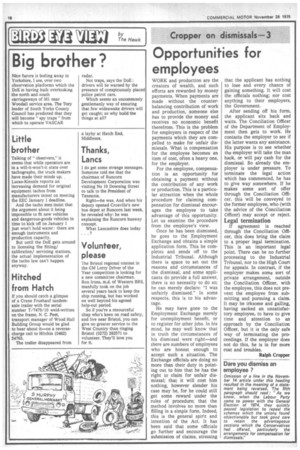Opportunities for employees
Page 18

If you've noticed an error in this article please click here to report it so we can fix it.
WORK and production are the creators of wealth, and such efforts are rewarded by money payments. When payments are made without the counterbalancing contribution Of work and production, someone else has to provide the money and receives no economic benefit therefrom. This is the problem for employers in respect of the payments which they are compelled to make for unfair dismissals. What is compensation for the employee becomes an item of cost, often a heavy one, for the employer.
For the employee, compensation is an opportunity for obtaining a payment without the contribution of any work or production. This is a particular attraction when the whole procedure for claiming compensation for dismissal encourages the employee to take advantage of this opportunity. Let us examine the procedure from the employee's view.
Once he has been dismissed, he goes to the Employment Exchange and obtains a simple application form. This he completes and sends off to the Industrial Tribunal. Although there is space to set out the reasons and circumstances of the dismissal, and some applicants do provide a full answer, there is no necessity to do so; he can merely declare: "I was unfairly dismissed." In some respects, this is to his advantage.
He may have gone to the Employment Exchange merely for unemployment benefit, or to register for other jobs. In his mind, he may well know that in truth the circumstances of his dismissal were right—and there are numbers of employees who are honest enough to accept such a situation. The Exchange offici-als are doing no more than their duty in pointing out to him that he has the right to claim for unfair dismissal; that it will cost him nothing, however slender his case may be, for he could still get some reward under the rules of procedure; that the method involves no more than filling in a simple form. Indeed, this is the general spirit and intention of the Act. It has been said that some officials' go further and encourage the submission of claims, stressing that the applicant has nothing to lose and every chance of gaining something. It will cost the officials nothing; nor cost anything to their employers, the Government.
After sending off his form, the applicant sits back and waits. The Conciliation Officer of the Department of Employment then gets to work. He contaots the employer to see if the latter wants any assistance. His purpose is to see whether the employer will take the man back, or will pay cash for the dismissal. So already the employer is under pressure. To terminate the legal action which has commenced, he has to give way somewhere. If he makes some sort of offer through the Conciliation Officer, this will be conveyed to the former employee, who (with the advice of the Conciliation Officer) may accept or reject.
Legal termination
If agreement is reached through the Conciliation Officer, this does bring the claim to a proper legal termination. This is an important legal point. There can be no further processing to the Industrial Tribunal, nor to the High Court for appeals. In contrast, if the employer makes some sort of private arrangement, outside the Conciliation Officer, with the employee, this does not prevent the employee from submitting and pursuing a claim. It may be irksome and galling, having sacked an unsatisfactory employee,, to have to give time and attention to an approach by the Conciliation Officer, but it is the only safe way of terminating the proceedings. If the employer does not do this, he is in for more cost and troubles.
Ralph Cropper
Dare you dismiss an employee ?
Omission of a fine in the November 14 article under this heading resulted in the meaning of a statement being reversed. The fifth paragraph should read : "As we know, when the Labour Party came to power with the General Election of 1974, they quickly passed legislation to repeal the schemes which the unions found objectionable but took good care to retain the advantageous sections which the Conservatives had offered, particularly the arrangements for compensation for dismissals"




































































